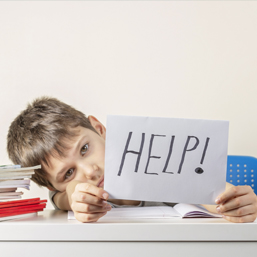
The school year is in full swing, and you’ve noticed that your child who was happy, relaxed, excited to begin school in September is now anxious and reluctant to engage in learning.
Come to think of it, this is a pattern you’ve noticed them display for a few years now. Students who struggle with academics often display this pattern. Most of the time, the heart of the issue is a learning struggle. However, these avoidance behaviors can also be labelled as ‘laziness,’ which impacts self-confidence. Laziness does exist, but it’s important to understand that avoiding a school assignment is often due to a difficulty and/or an inability to complete it successfully.
You need to advocate for your child when they are having difficulties with or can’t complete school assignments. Advocacy is a challenging path, but there are steps you can take if your child is falling behind in school:
1. Book an appointment with your child’s teacher and in a calm fashion, address your concerns about your child with the teacher.
2. Ask the teacher what you can do to help them help your child.
3. Ask the teacher for specifics. If they recommend more reading at home, for example, ask for strategies you can implement and which books are best for this purpose.
4. Children who struggle with reading require a few key things:
Remember: the recommendation of ‘more reading’ with your child doesn’t provide the specifics of the items above.
5. Make a plan and stick to it. For example, indicate to the teacher that you will do half an hour of reading and spelling each night with your child (using words and text provided or suggested by the teacher), and you will also keep a record of your child’s response each night.
6. Schedule a follow-up interview with the teacher. The interview should be sooner rather than later if your original plan is not working well. Setting up emails with your child’s teacher provides strong two-way communication in a timely fashion.
7. If your child displays persistent learning issues, ask the teacher if your child should undergo a complete psychoeducational assessment. This can identify potential learning disabilities and lead to school-based accommodations that can take the pressure off your child and diminish their anxiety.
8. Ask the teacher for recommendations for supplementary tutoring or instruction in reading, math, and writing. The best programs and instructors are the ones who offer ‘systematic’ and ‘structured’ programs. The right remedial program can go a long way to improving your child’s reading, comprehension, math, or written expression and turn your child into a more independent student.
9. Keep in mind that advocacy is continuous. Once a pasychoeducational assessment has been completed, an Individual Program Plan (IPP) must be written for your child. This can take time, so it’s important to communicate with your child’s teacher and the administrators at your school about how the IPP is progressing and when you can expect the IPP meeting to be held. The meeting will give you a chance to see the many strategies and accommodations the school will attempt and the learning goals they will set for your child.
10. Each year, ensure the teacher has read the IPP and can implement the recommendations. Students who exhibit long-standing literacy issues will require updated psychoeducational assessments and IPPs as they mature. Once helpful accommodations are found (such as extended time to write exams or use of a scribe), they can be continued even at the post-secondary level.
Above all, remember: you know your child best, so you are in the optimal position to advocate for your child to ensure they receive what they need. It can feel like a long journey to navigate, but a confident, happy, and successful student makes every effort worthwhile.
Dr. Steve Truch, founding director of The Reading Foundation, is a thought-leader in learning and literacy that has worked as a teacher and a school psychologist. For more information, visit readingfoundation.com.
Calgary’s Child Magazine © 2024 Calgary’s Child